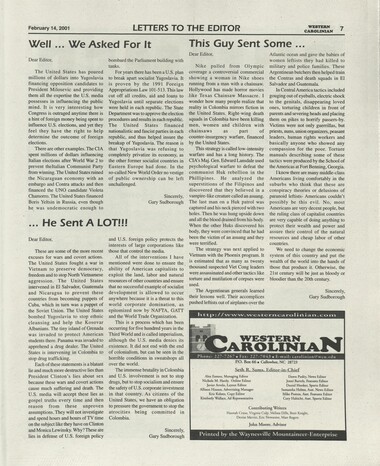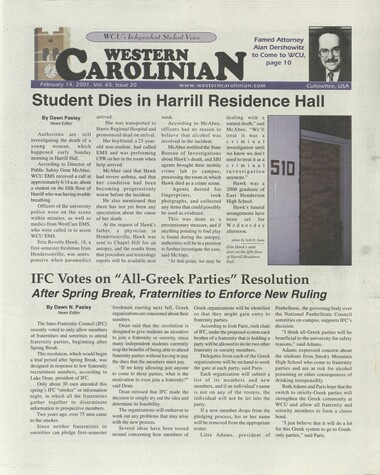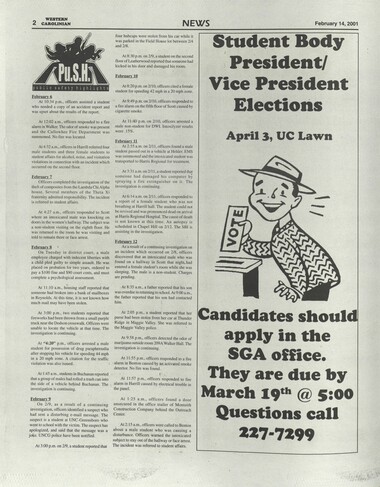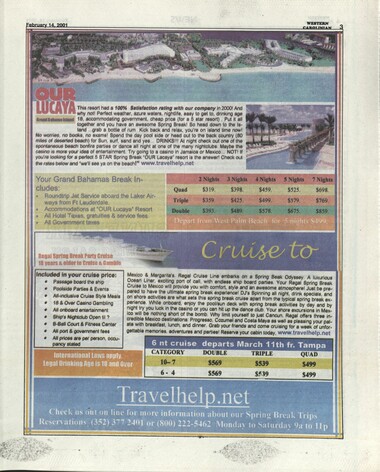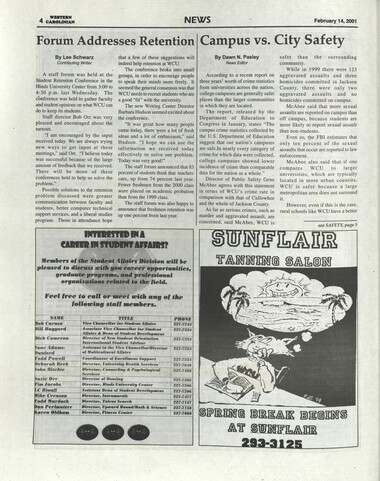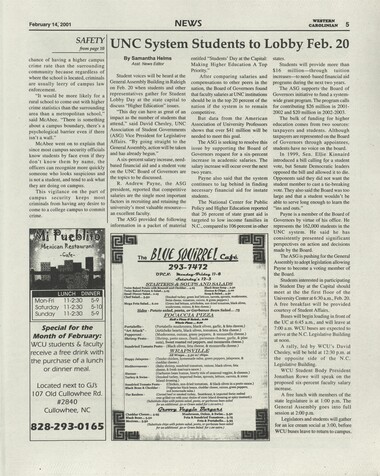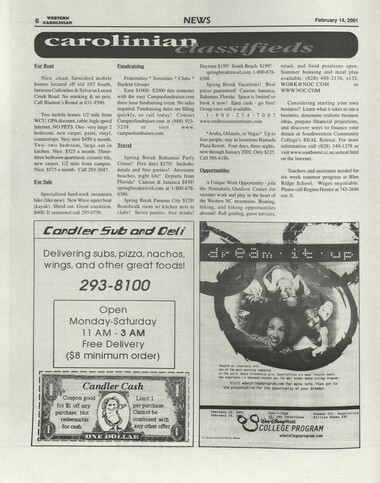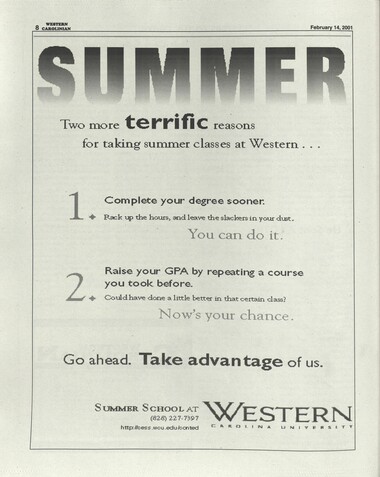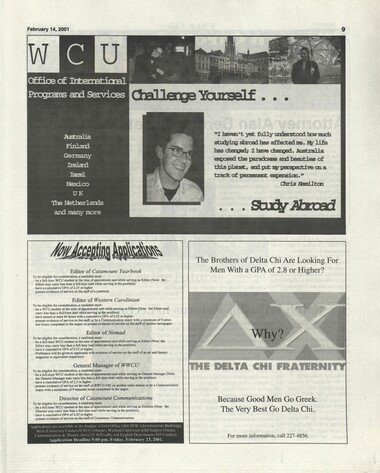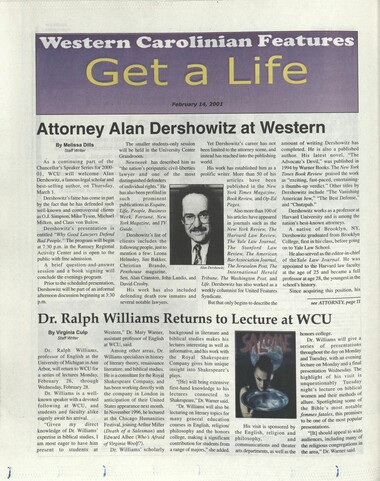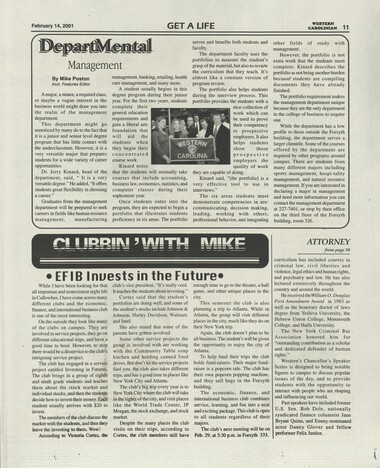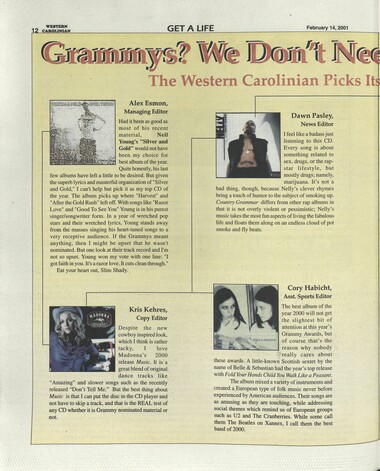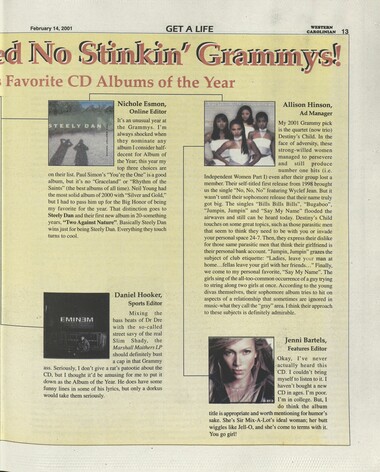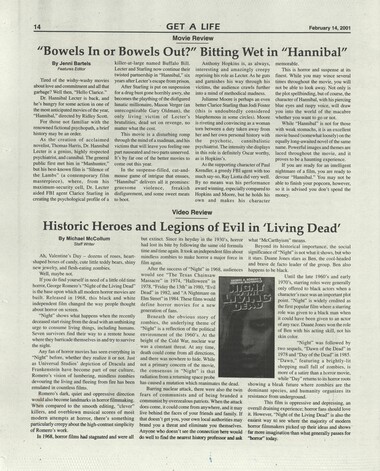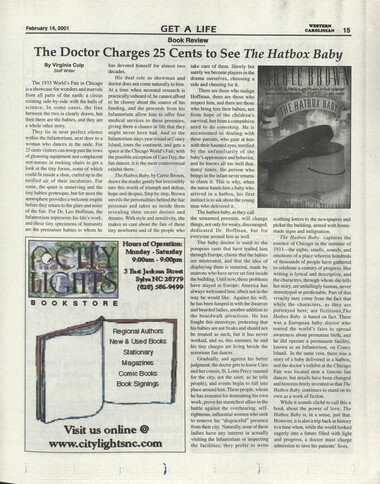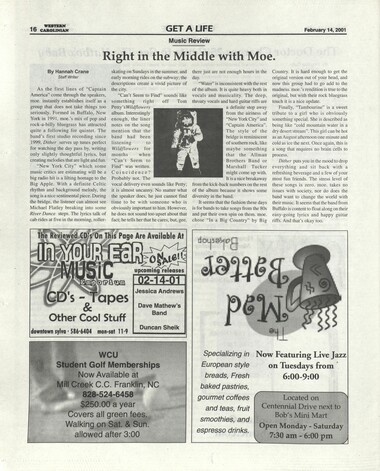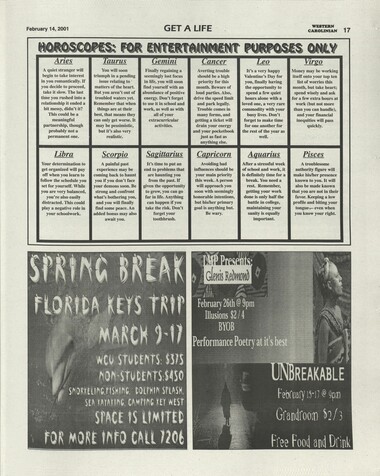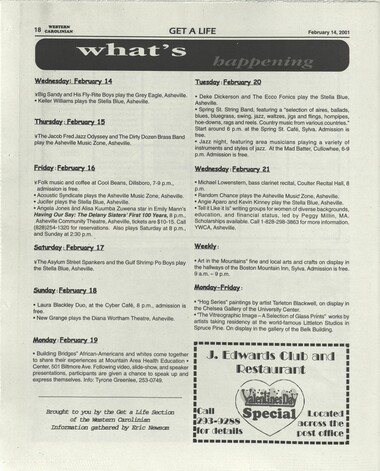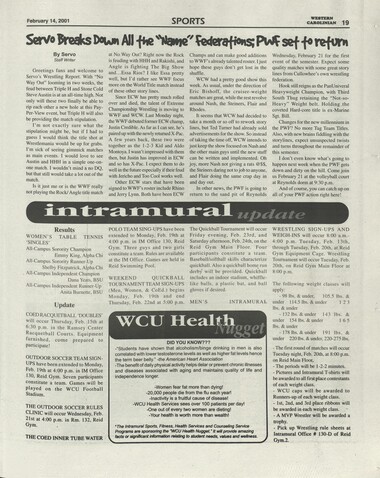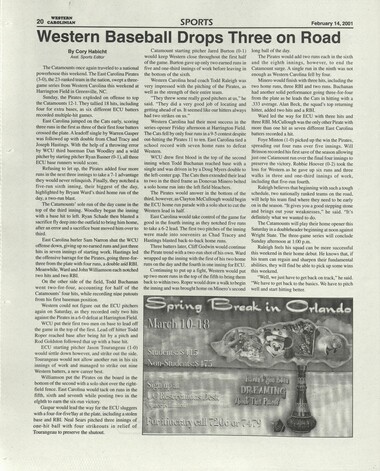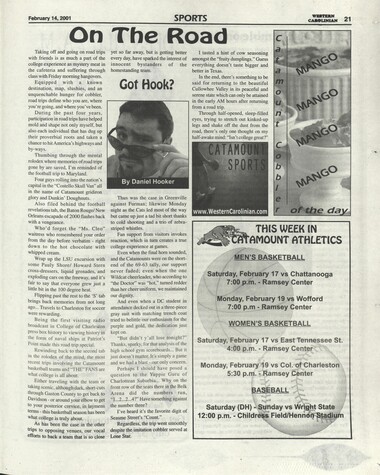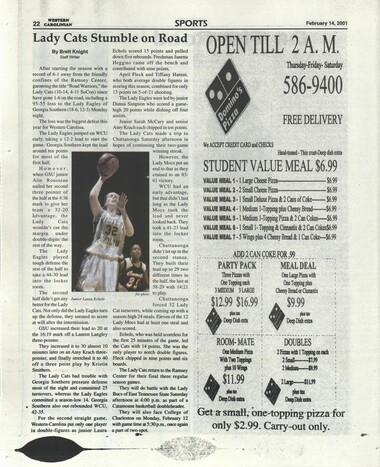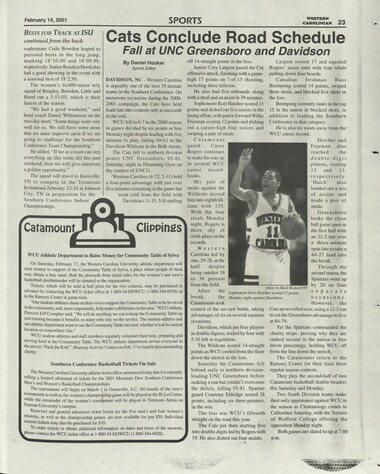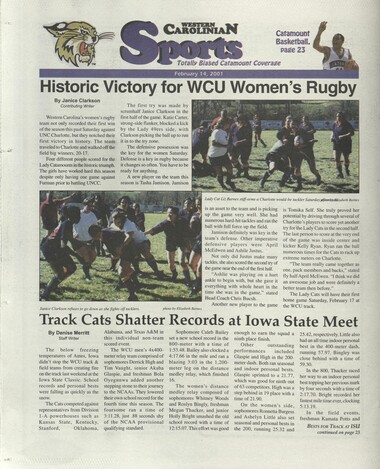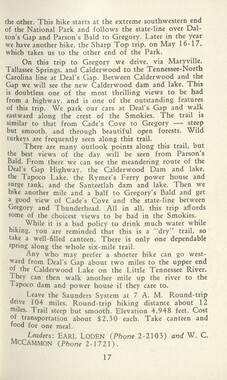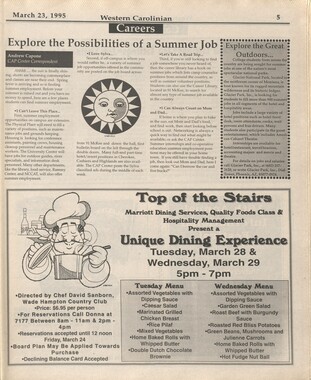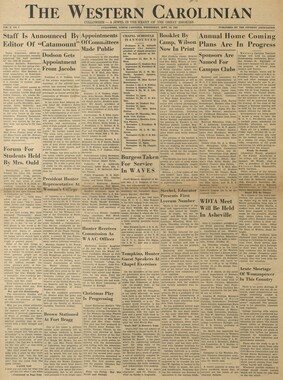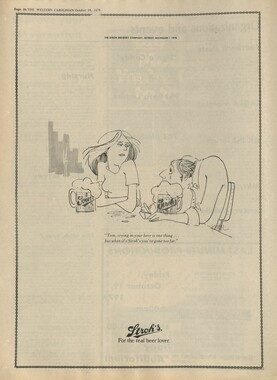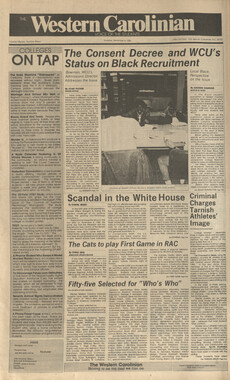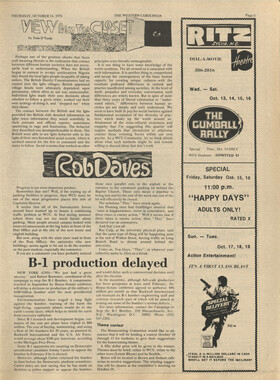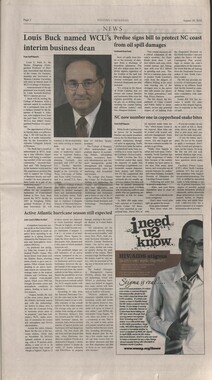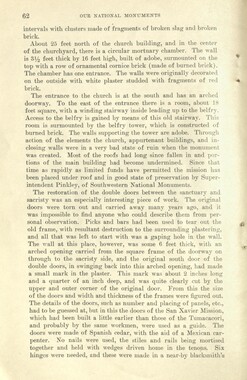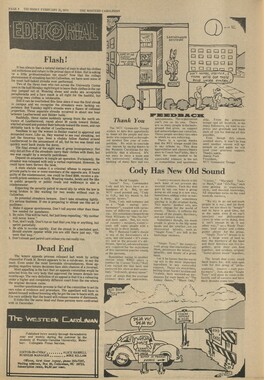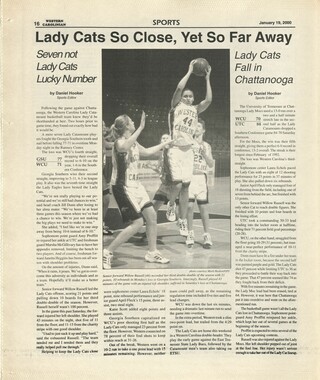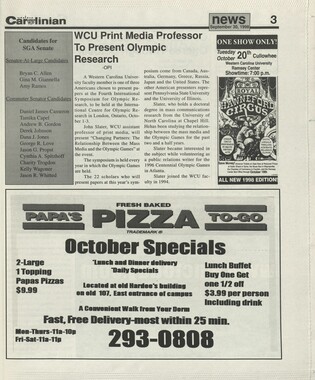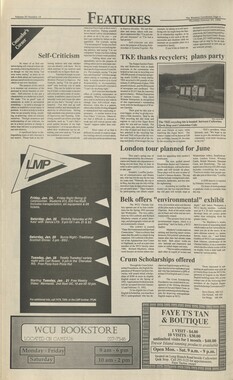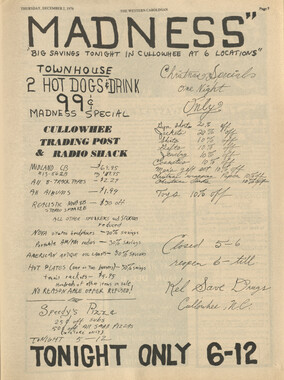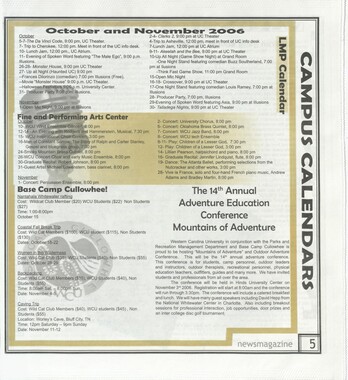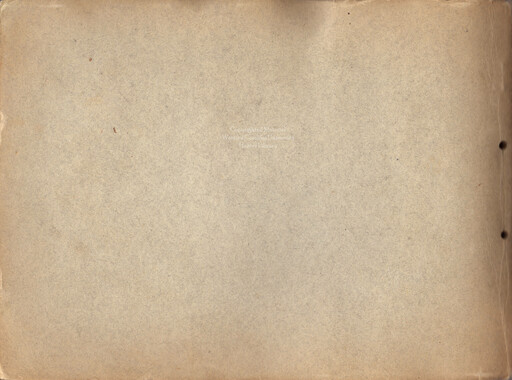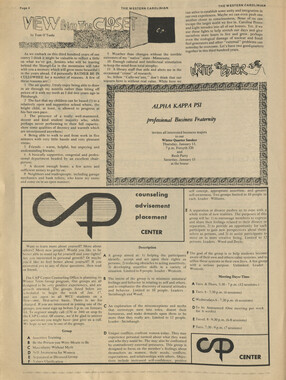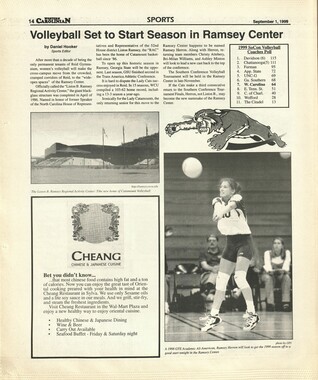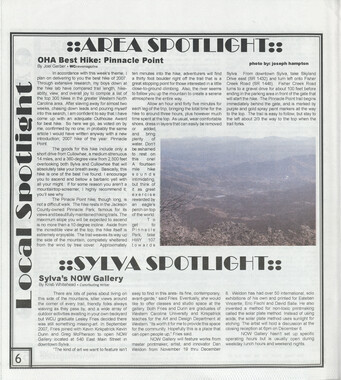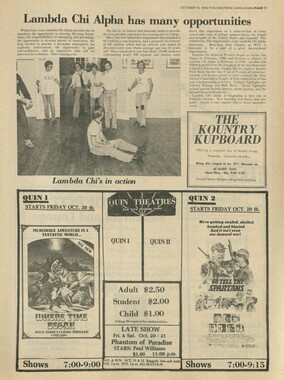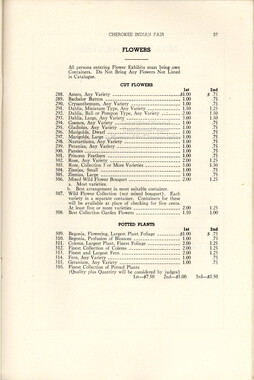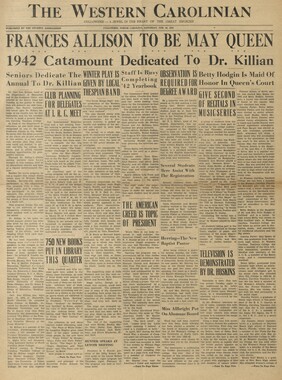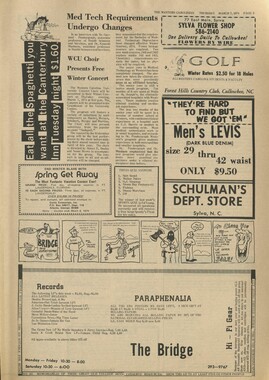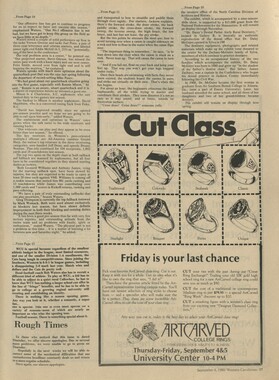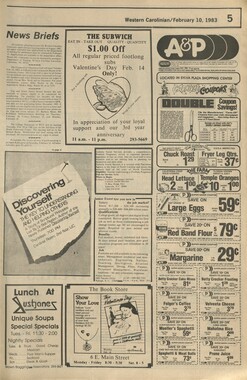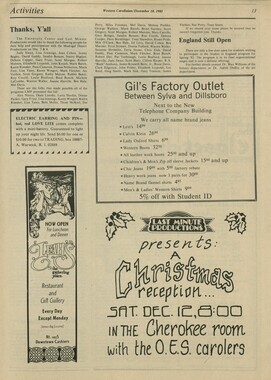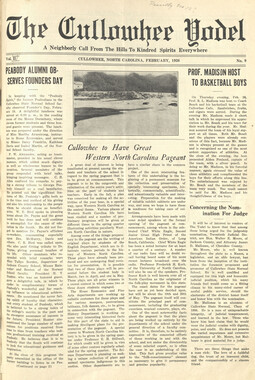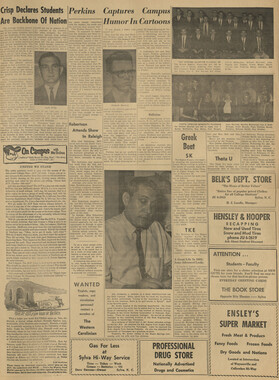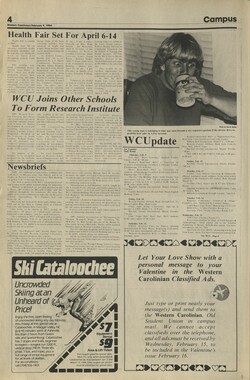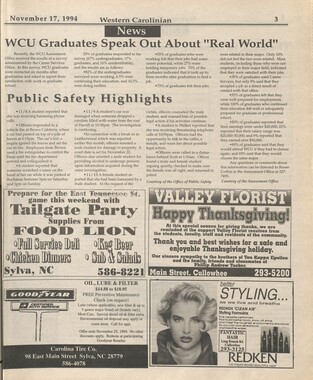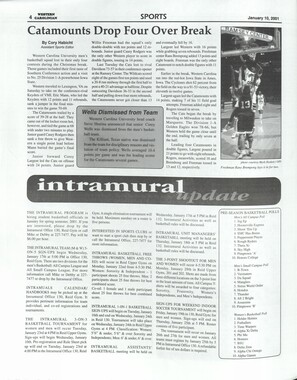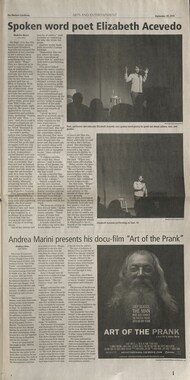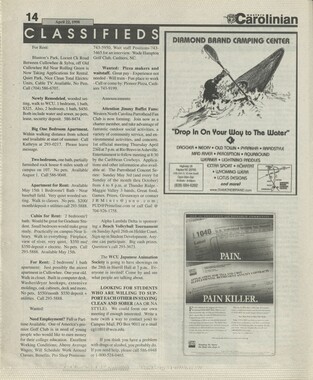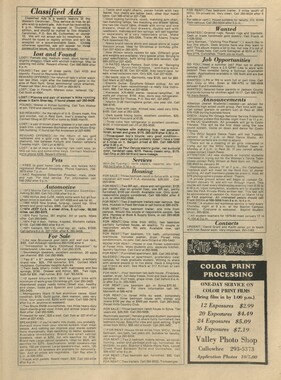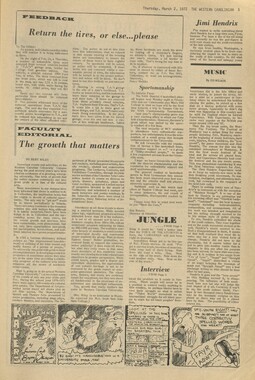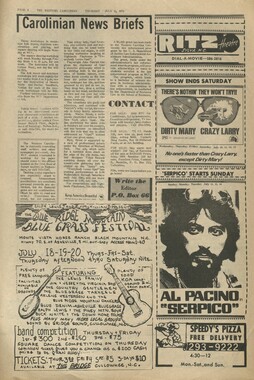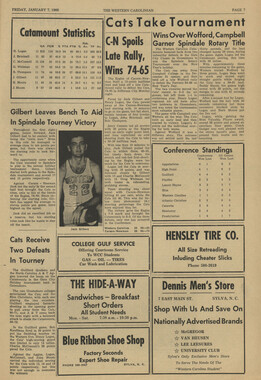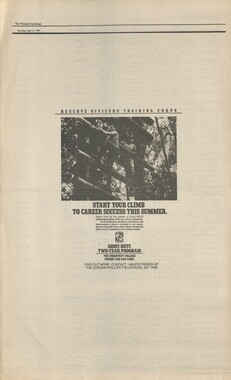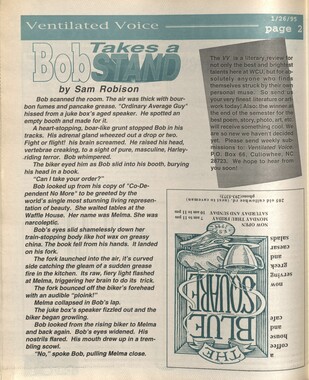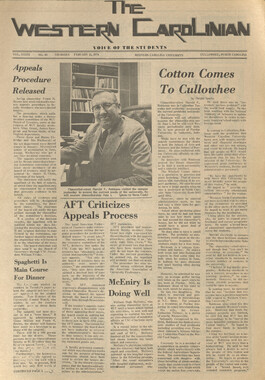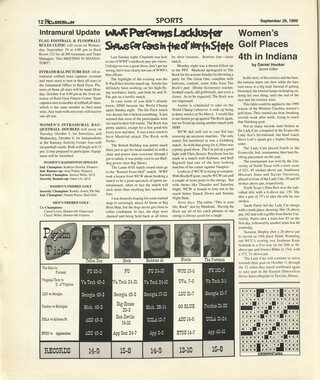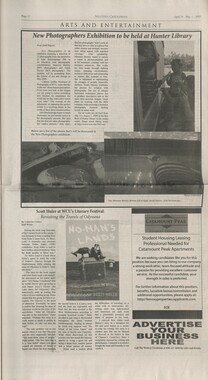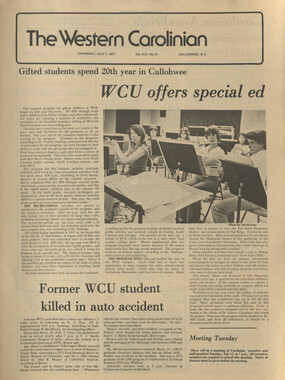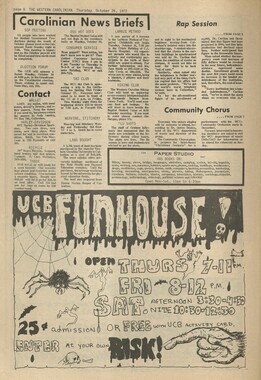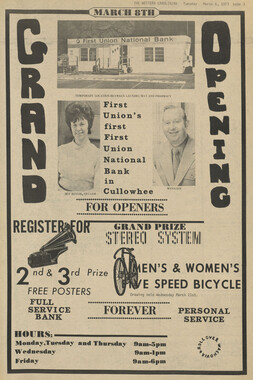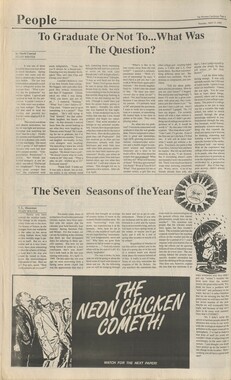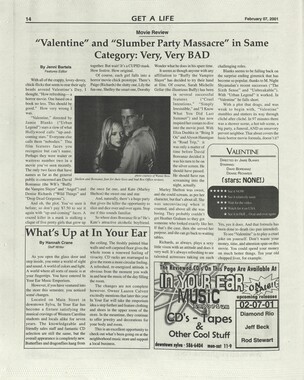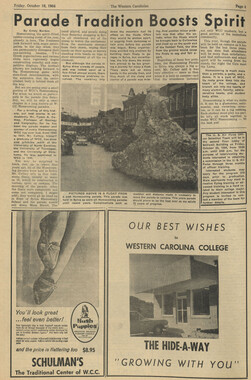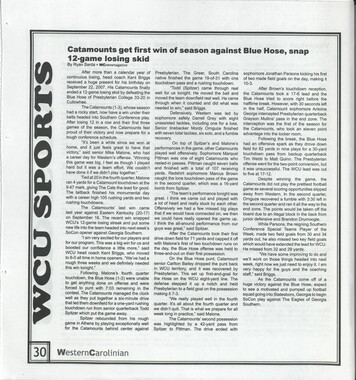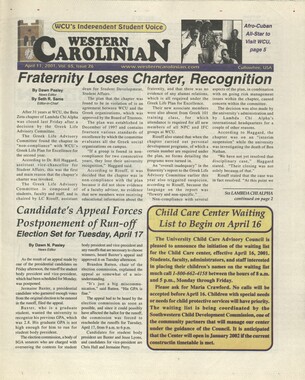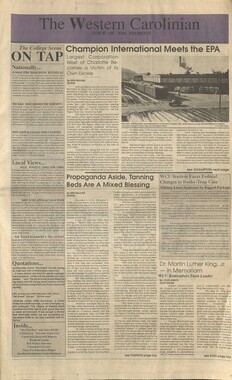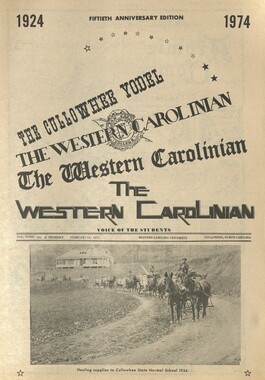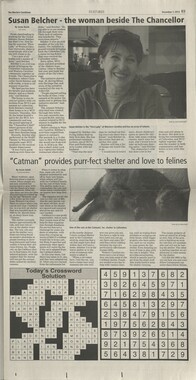Western Carolina University (20)
View all
- Canton Champion Fibre Company (2308)
- Cherokee Traditions (291)
- Civil War in Southern Appalachia (165)
- Craft Revival (1942)
- Great Smoky Mountains - A Park for America (2946)
- Highlights from Western Carolina University (430)
- Horace Kephart (941)
- Journeys Through Jackson (159)
- LGBTQIA+ Archive of Jackson County (85)
- Oral Histories of Western North Carolina (314)
- Picturing Appalachia (6873)
- Stories of Mountain Folk (413)
- Travel Western North Carolina (160)
- Western Carolina University Fine Art Museum Vitreograph Collection (129)
- Western Carolina University Herbarium (92)
- Western Carolina University: Making Memories (738)
- Western Carolina University Publications (2491)
- Western Carolina University Restricted Electronic Theses and Dissertations (146)
- Western North Carolina Regional Maps (71)
- World War II in Southern Appalachia (131)
University of North Carolina Asheville (6)
View all
- Western Carolina College (199)
- Western Carolina Teachers College (239)
- Western Carolina University (1976)
- Allanstand Cottage Industries (0)
- Appalachian National Park Association (0)
- Bennett, Kelly, 1890-1974 (0)
- Berry, Walter (0)
- Brasstown Carvers (0)
- Cain, Doreyl Ammons (0)
- Carver, George Washington, 1864?-1943 (0)
- Cathey, Joseph, 1803-1874 (0)
- Champion Fibre Company (0)
- Champion Paper and Fibre Company (0)
- Cherokee Indian Fair Association (0)
- Cherokee Language Program (0)
- Crittenden, Lorraine (0)
- Crowe, Amanda (0)
- Edmonston, Thomas Benton, 1842-1907 (0)
- Ensley, A. L. (Abraham Lincoln), 1865-1948 (0)
- Fromer, Irving Rhodes, 1913-1994 (0)
- George Butz (BFS 1907) (0)
- Goodrich, Frances Louisa (0)
- Grant, George Alexander, 1891-1964 (0)
- Heard, Marian Gladys (0)
- Kephart, Calvin, 1883-1969 (0)
- Kephart, Horace, 1862-1931 (0)
- Kephart, Laura, 1862-1954 (0)
- Laney, Gideon Thomas, 1889-1976 (0)
- Masa, George, 1881-1933 (0)
- McElhinney, William Julian, 1896-1953 (0)
- Niggli, Josephina, 1910-1983 (0)
- North Carolina Park Commission (0)
- Osborne, Kezia Stradley (0)
- Owens, Samuel Robert, 1918-1995 (0)
- Penland Weavers and Potters (0)
- Rhodes, Judy (0)
- Roberts, Vivienne (0)
- Roth, Albert, 1890-1974 (0)
- Schenck, Carl Alwin, 1868-1955 (0)
- Sherrill's Photography Studio (0)
- Smith, Edward Clark (0)
- Southern Highland Handicraft Guild (0)
- Southern Highlanders, Inc. (0)
- Stalcup, Jesse Bryson (0)
- Stearns, I. K. (0)
- Thompson, James Edward, 1880-1976 (0)
- United States. Indian Arts and Crafts Board (0)
- USFS (0)
- Vance, Zebulon Baird, 1830-1894 (0)
- Weaver, Zebulon, 1872-1948 (0)
- Western Carolina University. Mountain Heritage Center (0)
- Whitman, Walt, 1819-1892 (0)
- Wilburn, Hiram Coleman, 1880-1967 (0)
- Williams, Isadora (0)
- 1920s (57)
- 1930s (69)
- 1940s (114)
- 1950s (66)
- 1960s (314)
- 1970s (599)
- 1980s (406)
- 1990s (379)
- 2000s (282)
- 2010s (178)
- 1600s (0)
- 1700s (0)
- 1800s (0)
- 1810s (0)
- 1820s (0)
- 1830s (0)
- 1840s (0)
- 1850s (0)
- 1860s (0)
- 1870s (0)
- 1880s (0)
- 1890s (0)
- 1900s (0)
- 1910s (0)
- 2020s (0)
- Jackson County (N.C.) (2466)
- Appalachian Region, Southern (0)
- Asheville (N.C.) (0)
- Avery County (N.C.) (0)
- Blount County (Tenn.) (0)
- Buncombe County (N.C.) (0)
- Cherokee County (N.C.) (0)
- Clay County (N.C.) (0)
- Graham County (N.C.) (0)
- Great Smoky Mountains National Park (N.C. and Tenn.) (0)
- Haywood County (N.C.) (0)
- Henderson County (N.C.) (0)
- Knox County (Tenn.) (0)
- Knoxville (Tenn.) (0)
- Lake Santeetlah (N.C.) (0)
- Macon County (N.C.) (0)
- Madison County (N.C.) (0)
- McDowell County (N.C.) (0)
- Mitchell County (N.C.) (0)
- Polk County (N.C.) (0)
- Qualla Boundary (0)
- Rutherford County (N.C.) (0)
- Swain County (N.C.) (0)
- Transylvania County (N.C.) (0)
- Watauga County (N.C.) (0)
- Waynesville (N.C.) (0)
- Yancey County (N.C.) (0)
- Newsletters (510)
- Publications (documents) (1981)
- Aerial Photographs (0)
- Aerial Views (0)
- Albums (books) (0)
- Articles (0)
- Artifacts (object Genre) (0)
- Bibliographies (0)
- Biography (general Genre) (0)
- Cards (information Artifacts) (0)
- Clippings (information Artifacts) (0)
- Copybooks (instructional Materials) (0)
- Crafts (art Genres) (0)
- Depictions (visual Works) (0)
- Design Drawings (0)
- Drawings (visual Works) (0)
- Envelopes (0)
- Exhibitions (events) (0)
- Facsimiles (reproductions) (0)
- Fiction (general Genre) (0)
- Financial Records (0)
- Fliers (printed Matter) (0)
- Glass Plate Negatives (0)
- Guidebooks (0)
- Internegatives (0)
- Interviews (0)
- Land Surveys (0)
- Letters (correspondence) (0)
- Manuscripts (documents) (0)
- Maps (documents) (0)
- Memorandums (0)
- Minutes (administrative Records) (0)
- Negatives (photographs) (0)
- Newspapers (0)
- Notebooks (0)
- Occupation Currency (0)
- Paintings (visual Works) (0)
- Pen And Ink Drawings (0)
- Periodicals (0)
- Personal Narratives (0)
- Photographs (0)
- Plans (maps) (0)
- Poetry (0)
- Portraits (0)
- Postcards (0)
- Programs (documents) (0)
- Questionnaires (0)
- Relief Prints (0)
- Sayings (literary Genre) (0)
- Scrapbooks (0)
- Sheet Music (0)
- Slides (photographs) (0)
- Songs (musical Compositions) (0)
- Sound Recordings (0)
- Specimens (0)
- Speeches (documents) (0)
- Text Messages (0)
- Tintypes (photographs) (0)
- Transcripts (0)
- Video Recordings (physical Artifacts) (0)
- The Reporter, Western Carolina University (510)
- WCU Students Newspapers Collection (1923)
- A.L. Ensley Collection (0)
- Appalachian Industrial School Records (0)
- Appalachian National Park Association Records (0)
- Axley-Meroney Collection (0)
- Bayard Wootten Photograph Collection (0)
- Bethel Rural Community Organization Collection (0)
- Blumer Collection (0)
- C.W. Slagle Collection (0)
- Canton Area Historical Museum (0)
- Carlos C. Campbell Collection (0)
- Cataloochee History Project (0)
- Cherokee Studies Collection (0)
- Daisy Dame Photograph Album (0)
- Daniel Boone VI Collection (0)
- Doris Ulmann Photograph Collection (0)
- Elizabeth H. Lasley Collection (0)
- Elizabeth Woolworth Szold Fleharty Collection (0)
- Frank Fry Collection (0)
- George Masa Collection (0)
- Gideon Laney Collection (0)
- Hazel Scarborough Collection (0)
- Hiram C. Wilburn Papers (0)
- Historic Photographs Collection (0)
- Horace Kephart Collection (0)
- Humbard Collection (0)
- Hunter and Weaver Families Collection (0)
- I. D. Blumenthal Collection (0)
- Isadora Williams Collection (0)
- Jesse Bryson Stalcup Collection (0)
- Jim Thompson Collection (0)
- John B. Battle Collection (0)
- John C. Campbell Folk School Records (0)
- John Parris Collection (0)
- Judaculla Rock project (0)
- Kelly Bennett Collection (0)
- Love Family Papers (0)
- Major Wiley Parris Civil War Letters (0)
- Map Collection (0)
- McFee-Misemer Civil War Letters (0)
- Mountain Heritage Center Collection (0)
- Norburn - Robertson - Thomson Families Collection (0)
- Pauline Hood Collection (0)
- Pre-Guild Collection (0)
- Qualla Arts and Crafts Mutual Collection (0)
- R.A. Romanes Collection (0)
- Rosser H. Taylor Collection (0)
- Samuel Robert Owens Collection (0)
- Sara Madison Collection (0)
- Sherrill Studio Photo Collection (0)
- Smoky Mountains Hiking Club Collection (0)
- Stories of Mountain Folk - Radio Programs (0)
- Venoy and Elizabeth Reed Collection (0)
- WCU Gender and Sexuality Oral History Project (0)
- WCU Mountain Heritage Center Oral Histories (0)
- WCU Oral History Collection - Mountain People, Mountain Lives (0)
- Western North Carolina Tomorrow Black Oral History Project (0)
- William Williams Stringfield Collection (0)
- Zebulon Weaver Collection (0)
- College student newspapers and periodicals (1951)
- African Americans (0)
- Appalachian Trail (0)
- Artisans (0)
- Cherokee art (0)
- Cherokee artists -- North Carolina (0)
- Cherokee language (0)
- Cherokee pottery (0)
- Cherokee women (0)
- Church buildings (0)
- Civilian Conservation Corps (U.S.) (0)
- Dams (0)
- Dance (0)
- Education (0)
- Floods (0)
- Folk music (0)
- Forced removal, 1813-1903 (0)
- Forest conservation (0)
- Forests and forestry (0)
- Gender nonconformity (0)
- Great Smoky Mountains National Park (N.C. and Tenn.) (0)
- Hunting (0)
- Landscape photography (0)
- Logging (0)
- Maps (0)
- Mines and mineral resources (0)
- North Carolina -- Maps (0)
- Paper industry (0)
- Postcards (0)
- Pottery (0)
- Railroad trains (0)
- Rural electrification -- North Carolina, Western (0)
- School integration -- Southern States (0)
- Segregation -- North Carolina, Western (0)
- Slavery (0)
- Sports (0)
- Storytelling (0)
- Waterfalls -- Great Smoky Mountains (N.C. and Tenn.) (0)
- Weaving -- Appalachian Region, Southern (0)
- Wood-carving -- Appalachian Region, Southern (0)
- World War, 1939-1945 (0)
- Text (2491)
- MovingImage (0)
- Sound (0)
- StillImage (0)
Western Carolinian Volume 65 (66) Number 20
Item
Item’s are ‘child’ level descriptions to ‘parent’ objects, (e.g. one page of a whole book).
-
-
February 14, 2001 LETTERS TO THE EDITOR WESTERN CAROLINIAN Well... We Asked For It Dear Editor, The United States has poured millions of dollars into Yugoslavia financing opposition candidates to President Milosevic and providing them all the expertise the U.S. media possesses in influencing the public mind. It is very interesting how Congress is outraged anytime there is a hint of foreign money being spent to influence U.S. elections, and yet they feel they have the right to help determine the outcome of foreign elections. There are other examples. The CIA spent millions of dollars influencing Italian elections after World War 2 to prevent theltalian Communist Party from winning. The United States ruined the Nicaraguan economy with an embargo and Contra attacks and then financed the UNO candidate Violeta Chamorro. The United States financed Boris Yeltsin in Russia, even though he was undemocratic enough to ... He Sent A LOT!!! bombard the Parliament building with tanks. For years there has been a U.S. plan to break apart socialist Yugoslavia. It is proven by the 1991 Foreign Appropriations Law 101-513. This law cut off all credits, aid and loans to Yugoslavia until separate elections were held in each republic. The State Department was to approve the election procedures and results in each republic. The United States financed nationalistic and fascist parties in each republic, and thus helped insure the breakup of Yugoslavia. The reason is that Yugoslavia was refusing to completely privatize its economy, as the other former socialist countries in Eastern Europe had done. In the so-called New World Order no vestige of public ownership can be left unchallenged. Sincerely, Gary Sudborough Dear Editor, These are some of the more recent excuses for wars and covert actions. The United States fought a war in Vietnam to preserve democracy, freedom and to stop North Vietnamese aggression. The United States intervened in El Salvador, Guatemala and Nicaragua to .prevent these countries from becoming puppets of Cuba, which in turn was a puppet of the Soviet Union. The United States bombed Yugoslavia to stop ethnic cleansing and help the Kosovar Albanians. The tiny island of Grenada was invaded to protect American students there. Panama was invaded to apprehend a drug dealer. The United States is intervening in Colombia to stop drug trafficking. Each of these statements is a blatant lie and much more destructive lies than President Clinton's lies about sex because these wars and covert actions cause much suffering and death. The U.S. media will accept these lies as gospel truths every time and then reason from these unproven assumptions. They will not investigate and spend hours and hours of TV time on the subject like they have on Clinton and Monica Lewinsky. Why? These are lies in defense of U.S. foreign policy This Guy Sent Some ... and U.S. foreign policy protects the interests of large corporations like those that control the media. All of the interventions I have mentioned were done to ensure the ability of American capitalists to exploit the land, labor and natural resources of other countries and ensure that no successful example of socialist development is allowed to occur anywhere because it is a threat to this world corporate domination, as epitomized now by NAFTA, GATT and the World Trade Organization. This is a process which has been occurring for five hundred years in the Third World and is called imperialism, although the U.S. media denies its existence. It did not end with the end of colonialism, but can be seen in the horrible conditions in sweatshops all over the world. The immense brutality in Colombia and U.S. involvement is not to stop drugs, but to stop socialism and ensure the safety of U.S. corporate investment in that country. As citizens of the United States, we have an obligation to pressure the government to stop the atrocities being committed in Colombia. Sincerely, Gary Sudborough Dear Editor, Nike pulled from Olympic coverage a controversial commercial showing a woman in Nike shoes running from a man with a chainsaw. Hollywood has made horror movies like Texas Chainsaw Massacre. I wonder how many people realize that reality in Colombia mirrors fiction in the United States. Right-wing death squads in Colombia have been killing men, women and children with chainsaws as part of counter-insurgency warfare, financed by the United States. This strategy is called low-intensity warfare and has a long history. The CIA's Maj. Gen. Edward Lansdale used psychological warfare to defeat the communist Huk rebellion in the Phillipines. He analyzed the superstitions of the Filipinos and discovered that they believed in a vampire-like creature called an asuang. The last man on a Huk patrol was captured and his neck pierced with two holes. Then he was hung upside down and all the blood drained from his body. When the other Huks discovered his body, they were convinced that he had been the victim of an asuang and they were terrified. The strategy was next applied to Vietnam with the Phoenix program. It is estimated that as many as twenty thousand suspected Viet Cong leaders were assassinated and other tactics like torture and mutilation of corpses were used. The Argentinean generals learned their lessons well. Their accomplices pushed leftists out of airplanes over the Atlantic ocean and gave the babies of women leftists they had killed to military and police families. These Argentinean butchers then helped train the Contras and death squads in El Salvador and Guatemala. In Central America tactics included gouging out of eyeballs, electric shock to the genitals, disappearing loved ones, torturing children in front of parents and severing heads and placing them on pikes to horrify passers-by. Victims were not only guerrillas, but priests, nuns, union organizers, peasant leaders, human rights workers and basically anyone who showed any compassion for the poor. Torture manuals describing some of these tactics were produced by the School of the Americas at Fort Benning, Georgia. I know there are many middle-class Americans living comfortably in the suburbs who think that these are conspiracy theories or delusions of paranoid leftists- Americans couldn't possibly be this evil. No, most Americans are very decent people, but the ruling class of capitalist countries are very capable of doing anything to protect their wealth and power and assure their control of the natural resources and cheap labor of other countries. We need to change the economic system of this country and put the wealth of the world into the hands of those that produce it. Otherwise, the 21st century will be just as bloody or bloodier than, the 20th century. Sincerely, Gary Sudborough h ttp: / / wvvw. »1 i t \ i I WESTERN -^or aroliniaN Phone: 227-726, 043 • E-mail: caroiinian@wcu.edu P.O. Box 66 • Cullowhee, NC 28723 Seth R. Sams, Editor-in-Chief Alex Esmon, Managing Editor Nichole M. Hardy, Online Editor Javier Arvelo, Layout Editor Allison Hinson, Advertising Manager Kris Retires, Copy Editor Kimberly Wallace, Ad Representative Dawn Pasley, News Editor Jenni Bartels, Features Editor Daniel Hooker, Sports Editor Samantha Helms, Asst. News Editor Mike Poston, Asst. Features Editor Cory Habicht, Asst. Sports Editor Contributing Writers Hannah Crane, Virginia Culp, Melissa Dills, Brett Knight, Denise Merritt, Eric Newsome, Matt Rogers John Moore, Advisor Printed by the Waynesville Mountaineer-Enterprise
Object
Object’s are ‘parent’ level descriptions to ‘children’ items, (e.g. a book with pages).
-
The Western Carolinian is Western Carolina University's student-run newspaper. The paper was published as the Cullowhee Yodel from 1924 to 1931 before changing its name to The Western Carolinian in 1933.
-
